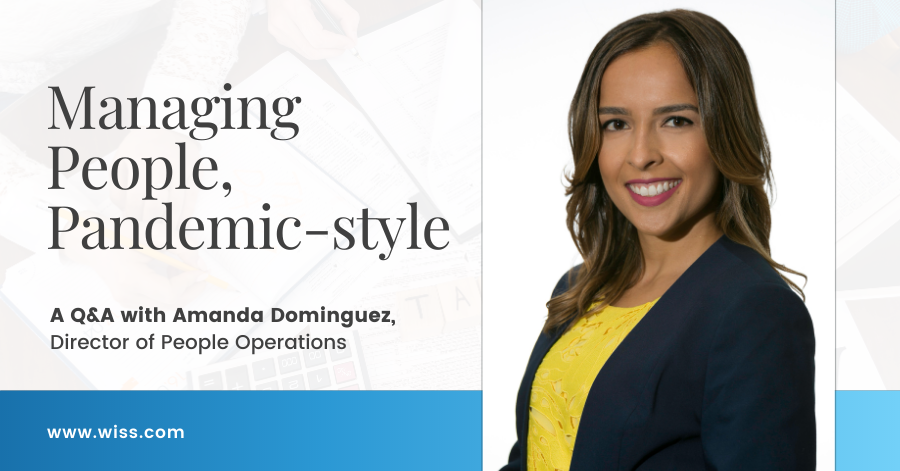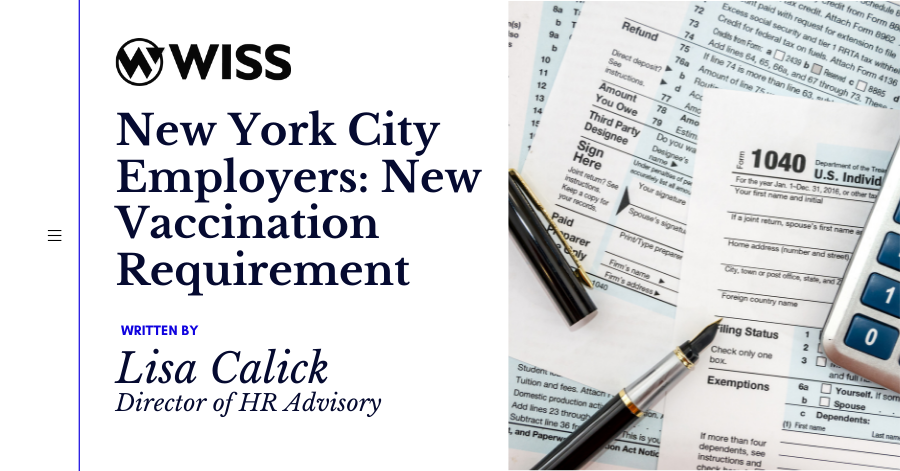Series introduction: In this four-part Q&A series, Senior Professional in Human Resources (SPHR) Lisa Calick speaks with experts from Wiss to learn about the challenges that clients face due to the changes in work arrangements and culture as a result of the pandemic.
As a Senior Professional in Human Resources (SPHR), I spend my days giving human resources advice to Wiss clients, helping them with everything from benefits inquiries to staying in compliance with employment laws. My job is to help clients strengthen their operational processes to allow them to focus on their core strategic support.
I am interviewing experts from Wiss about the challenges clients may face due to the pandemic and the new work-from-home paradigm. I spoke with Wiss’s Director of People Operations Amanda Dominguez about how companies can manage their people in this unusual time for workplaces.
My key take-away from this interview is that in an environment where some employees are working remotely while others are in the office, managers need to tailor their style to the circumstances while also being rigorous about inclusivity and communication. People both in and out of the office should be getting feedback and should be able to understand how they’re doing. It’s all about communicating and having compassion for people’s circumstances while setting expectations and making sure that everyone is still on a level playing field.
A lot of companies have a mix of employees in the office and employees at home right now. What is the biggest challenge a company might face, given that situation?
With employees on hybrid or alternating schedules, you have to figure out a way to manage both employees at home and employees in the office, and to do it in a way where you’re not making anyone feel excluded.
I think that’s the biggest thing. You want to be inclusive, be compassionate, be accommodating of everyone’s circumstances, and still make them feel like they’re on the same playing field.
Do you see managing this hybrid situation being more difficult given the different generations that an employer may have at work? Does that make it more complex?
Yes, certainly. The pandemic has introduced a new layer of complexity in trying to juggle everyone’s unique circumstances.
We might have certain groups of people who are feeling isolated; they want to come back to the office and feel connected with their colleagues. And then you have other groups of people who are fearful for their health and don’t want to come in, or caretakers who need to be home to care for their children or family members.
The goal is to lead with compassion and strike a healthy balance in accommodating both the needs of your people and the needs of the organization. We try to keep a pulse on all of these different issues. We’ve been sending out surveys regularly to try to understand how people are feeling on both ends of the spectrum and in the middle. And then just pivoting and adjusting as we’re getting that feedback. You also can’t be overly communicative in this environment.
I agree that surveys are an important tool employers can use. What should companies consider when sending these out to their employees?
I think the number one action step is to communicate back. Let your employees know that you hear and acknowledge their thoughts, feedback, and concerns. Let them know what you’re reasonably able to address and how you’re going to do that. And also try to address what you can’t accommodate and explain why.
With more people coming into the office, even in this hybrid environment, I would think that there are times when people do want to meet face-to-face in the office. Do those in-person interactions impact those working remotely?
People do tend to want that interpersonal connection, and they do want to meet in person if it’s possible. Despite that, I would encourage everyone to continue to meet in a way that allows for everyone to be on the same playing field.
If you have a mix of people at home and in the office, continue to use those virtual collaboration tools. Make sure that even if you have some people that are physically with you in the meeting, allow your remote employees to still meet with you remotely. Those at home should be using video so you still get to see their face. Everyone should feel that they’re an equal part of the team and on the same wavelength.
What conversations should companies be having with their managers and supervisors?
We’re all learning. It’s a new set of circumstances for all of us. Managers need to understand not only how to manage a remote team, but also how to tailor their management style to the different circumstances and set expectations accordingly.
You might have employees who are starting their careers and are going to need more touch points – more mentoring and more training. Others need increased flexibility because they’re tending to their household during traditional work hours.
There is a lot of complexity in what we’re navigating, so managers need to be aware of the issues affecting their teams, and they need to be overly communicative and to set clear expectations.
Okay, that makes sense. In terms of performance management, every company has its own review system, but they need to make sure there’s a process in place so that they can manage employee performance remotely.
And along with that, if a company is giving out salary adjustments as they normally would, they should be measuring performance fairly between people who are at home and people in the office.
Yes, 100 percent. Everyone has to have the same set of rules. Companies should always take a step back after any performance or compensation decisions to look for areas where you may have made an unfair assessment or one that may have been influenced by unconscious bias.
Regarding performance management, I think in general this applies to pre-pandemic and post-pandemic. We at Wiss have moved away from placing so much emphasis on the annual review because we believe that whether you’re at home or in the office, ongoing real-time feedback is the key to success. At Wiss, we’ve put virtual tools in place to encourage that.
We also supplement our review process with our mentoring program, which forces two individuals to be accountable to each other for follow-up on performance and to establish performance goals to work toward.
If you have a more traditional performance management process in place, I would suggest transitioning to a bi-annual process or supplementing with a mentor or career-counseling program so that you’re increasing the opportunity for developmental conversations. Increasing the touchpoints on performance will not only help to eliminate the anxiety surrounding performance conversations, but it will help you to better engage your employees and maximize their potential.

 Previous
Previous






